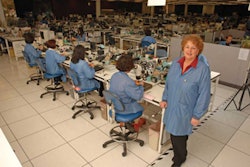Dublin, Calif.—Aug. 22, 2013—Epicor Software Corp., a provider of business software solutions for manufacturing, distribution, retail and services organizations, announced that Teconnex, a UK-based manufacturer of specialized clamps and joints for a wide range of industries, has selected the Epicor next-generation enterprise resource planning (ERP) solution to replace its existing manufacturing and finance systems.
Teconnex employs 230 staff in the UK, US and China, and has achieved significant growth, doubling in size over the last four years. With demand greater than ever for its clamping and jointing solutions, the management team used the opportunity of existing manufacturing software reaching its end of life to look for an ERP solution to replace discrete software products supporting finance, manufacturing, quotations, customer relationship management (CRM) and quality control.
“We wanted to bring all the key functions of the business into a single solution, to give us better visibility and control, as well as serve our customers more effectively,” said Mark Watson, logistics manager at Teconnex. “Using Epicor will allow us to improve our already recognised world-beating quality of service, and be more agile as a business.”
As an international business with exports to EMEA and the US contributing 80 percent of revenue, Teconnex wanted to ensure that the replacement system offered excellent finance, planning, scheduling and shipping features. After reviewing 10 products, the Epicor ERP solution was selected due to its high level of integration and features, not just between business functions, but also with one of the company’s most used piece of software, Microsoft Outlook.
“Our staff will have all the information they need at their fingertips, available in real-time,” added Daniel Topp, IT manager at Teconnex. “We will be able to streamline our processes, run what-if analysis on our schedules when there are unexpected changes in the supply chain, and accommodate urgent orders more effectively without negatively impacting the existing production schedule.”















![Pros To Know 2026 [color]](https://img.sdcexec.com/mindful/acbm/workspaces/default/uploads/2025/08/prostoknow-2026-color.mduFvhpgMk.png?ar=16%3A9&auto=format%2Ccompress&bg=fff&fill-color=fff&fit=fill&h=135&q=70&w=240)


